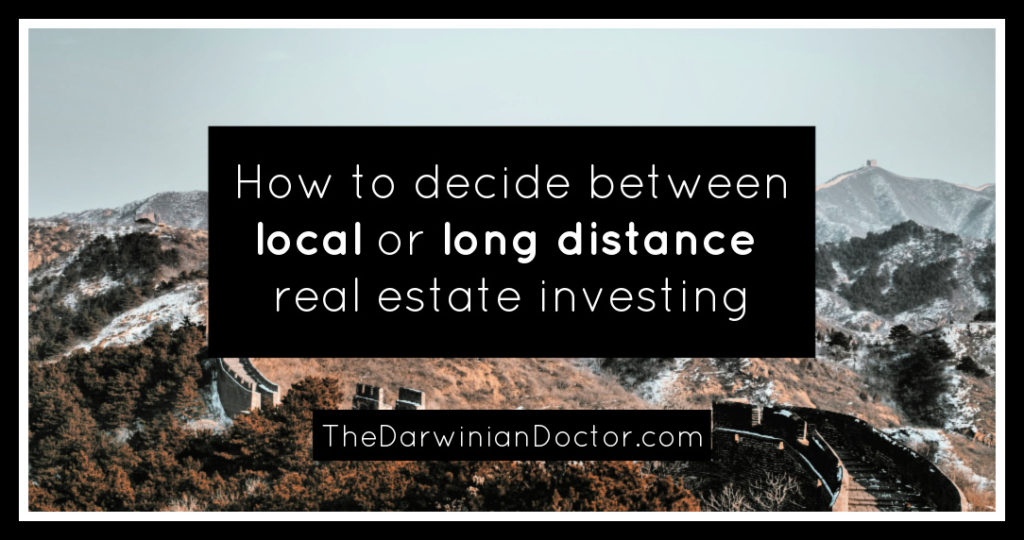Today’s post goes over my tips for deciding between local or long distance real estate investing. There are really three things to ask yourself when making this decision…

This post may contain affiliate links.
There’s a typical progression that happens when I talk to friends about real estate.
First, we have a conversation where their mind is blown that it’s possible to invest in real estate, instead of just stocks and index funds.
When they realize that I’m not kidding about being a real estate investor, they ask where I invest. When I tell them I mainly invest out-of-state in Indianapolis, their mind is blown a second time.
For most people, that’s where the conversation ends. But a small percentage of them will start down the slippery slope of Rich Dad, Poor Dad and then the real estate investing blogs and podcasts.
Local or long distance real estate investing?
A few weeks or months later, these curious investors will inevitably come back and ask how to decide if they should invest locally or long distance. After a bunch of these conversations lately, I decided to write a few tips into a blog post that explains my thinking on this decision.
The basic questions
There are three questions to answer when you’re making this decision:
- What are your overall financial goals (and your Why?)
- Do you want cash flow, appreciation, or both?
- Will you self-manage or use property management?
What are your overall financial goals (and your Why?)
I always start with this, because it’s such a fundamental question. It requires some introspection and knowledge of your current financial position. Then it takes mentally projecting forward five, ten, and thirty years down the line.
You should be able to answer questions like: Do I just want to get out of my student debt hole? Do I want to grow my wealth to the maximum by the time I die and leave it to my kids? Or do I want to hit financial independence in the near future?
Unless you spend the time thinking about these questions, it’s tough to really know how best to advise you.
As you consider these questions, you’ll start to develop an understanding of your financial goals and your Why (motivation).
My financial goals and my Why
My near term financial goal is a SMART goal that I want to achieve within the next 5 years:
I must have $100,000 of tax-free annual cash flow from rental properties by 2025.
This goal is in direct support of my Why, which is to have more time in my life for family, friends, and freedom.
My overall financial goal is to achieve morbidly obese financial independence (moFIRE) within the next 10 years.
Having a good understanding of these things really helps to focus my investing, which brings me to the next question:
Do you want cash flow, appreciation, or both?
Now that you’ve defined your financial goals and your Why, you can more easily answer the question of what type of return you’re going for.
Most real estate markets can be defined as one of these categories: cash flow markets, appreciation markets, or hybrid markets (both). As a quick example, Los Angeles is regarded as a cyclical appreciation market. Indianapolis, on the other hand, is somewhere between a cash flow or hybrid market.
For me, I’m more focused on cash flow, because as I’ve discussed before, cash flow is really important for those seeking early financial independence. (You can’t buy avocado toast with VTSAX!) This means I lean towards investing in markets that typically have a higher rent to value ratio, like the Midwest and Southeast.
If generating cash flow now isn’t the priority, this opens up appreciation markets like the coastal cities. These markets may not typically generate as much monthly cash flow per dollar invested, but there’s greater potential for massive long term appreciation.
Will you self-manage or use property management?
While as important as the others, this question can also help you figure out your real estate strategy.
Do you absolutely want to be able to drive by your property to check on it? Are you willing to put in a little extra hands-on effort to maximize the returns from your investment? Then perhaps you’re destined for self management!
Do you want to focus your efforts on deal acquisition, and then hand off the tenant management to a trusted third party? Then perhaps you’re more likely to use property management in your real estate investing strategy.
Most would agree that self-management is easier if you invest locally, and property management is a great match for long distance real estate investing. (Plenty of investors I know challenge this paradigm, but it’s a pretty defensible starting point.)
Putting it all together
The final piece of the puzzle is to know what kind of real estate market you live in. Are you looking for cash flow like me, with a hope to become financially free within the next 10 years? Do you happen to live in Indianapolis, Kansas City, or Birmingham? Congratulations, you can be a local real estate investor! Buy that duplex next door and get cracking. You can use property management if you’d like, or accelerate your progress even faster with self-management.
But say you live in South Dakota, and you don’t care as much about maximizing cash flow right now. Instead, perhaps you’d like to build a small but costly portfolio that’s likely to achieve strong appreciation over the long term. Then become a long distance real estate investor and build a team in Los Angeles or Miami to get some of that coastal appreciation!
Of course, this last step means you need the tools to learn about real estate markets around the country. Don’t worry, I’ve got you covered. That post has been on my to-do list for a while, and I’ll get it out soon.
Conclusion
I hope this discussion was helpful in deciding between local or long distance real estate investing. To summarize my tips, I recommend you first consider your overall financial goals and your Why (your motivation). This will help you decide if you want to maximize cash flow or appreciation. Then, you can decide if you want to self manage your real estate, or use property management.
Combine these three things with information about real estate markets, and you’ll have a much better idea on whether you should invest in local real estate, or go for long distance investing instead.
Have a great week!
— TDD
If you’re a real estate investor, please comment below on how you made the decision between local or long distance real estate investing. Any other big questions you think readers should consider? Please subscribe for more content!
Perhaps you’re more of a Facebook type?
Are you a physician, spouse, or professional and you’re interested in using Real Estate to gain financial freedom? Join us in our Facebook group and accelerate your journey!


Want to support the blog?
- Join our investor club at Cereus Real Estate
- Visit my Recommendations page
- Check out my wife’s food blog: Eat Dessert First
- Stay at our luxury short term rentals
- Check out my TikTok channel
- Follow me on Instagram
- Follow me on YouTube
- Contact me with questions


7 comments
We thought it was important to have both! In the same way we try to diversify our stocks, our goal is to have some variability in our real estate portfolio. Learning how to self manage locally hopefully will also give us the tools to work with management from afar.
I love this approach! For us, I think our “local” option will eventually be a short term rental. But it’s hard to make myself participate in the current housing craze in the SoCal region.
[…] out-of-state has become more and more popular. But how do you decide which is best for you? In this article, The Darwinian Doctor breaks down that exact […]
[…] the first post in the series, I presented three questions to help you decide between local or long distance real estate […]
Nice post so far. Thanks for sharing your amazing blog.
Thank you for reading!
Choosing between local and long-distance real estate investing depends on your goals. Local offers hands-on control and market familiarity, while long-distance might provide diversification and potential for higher returns. Consider your risk tolerance and resources. Thanks for addressing this dilemma!